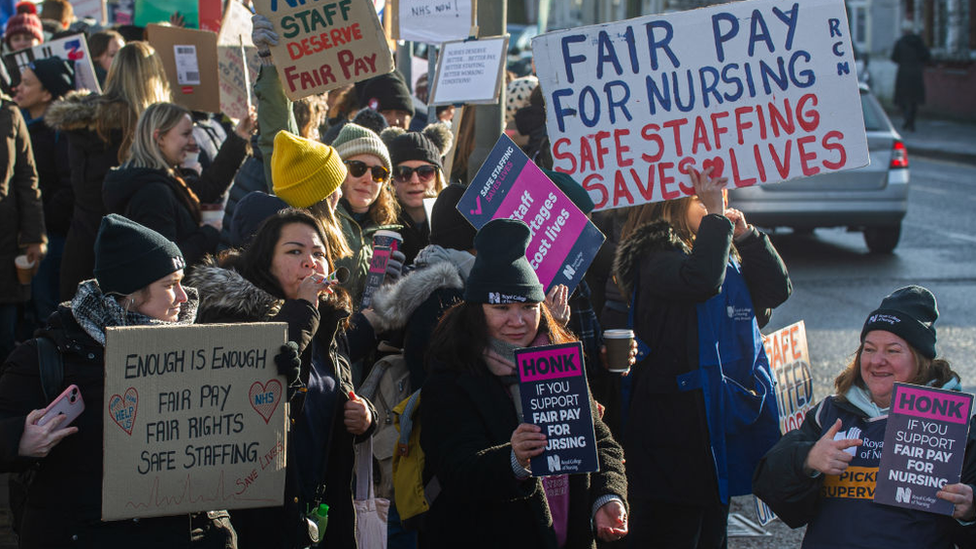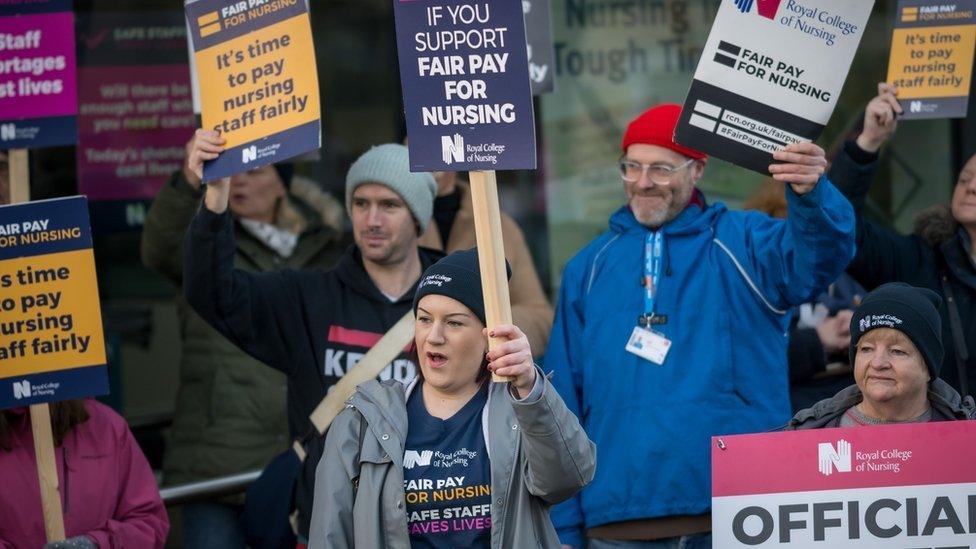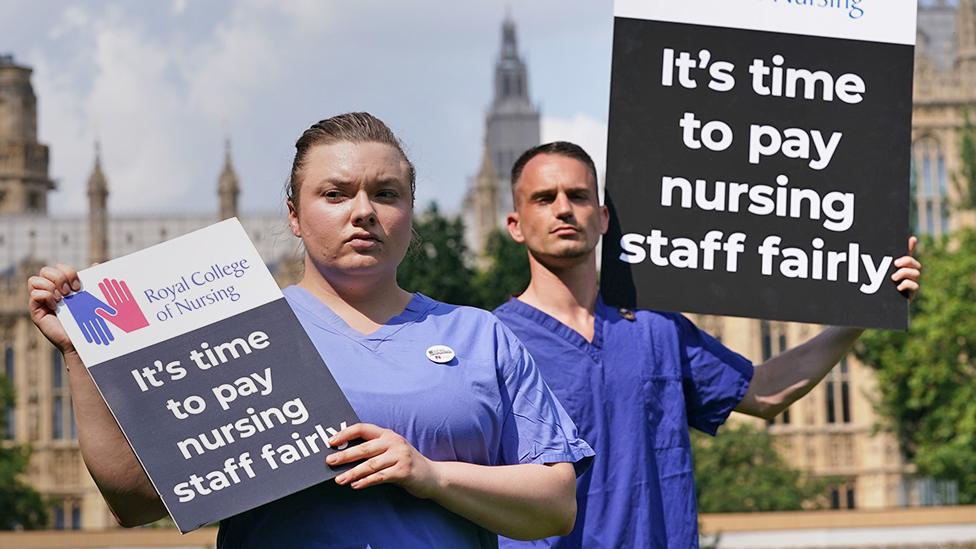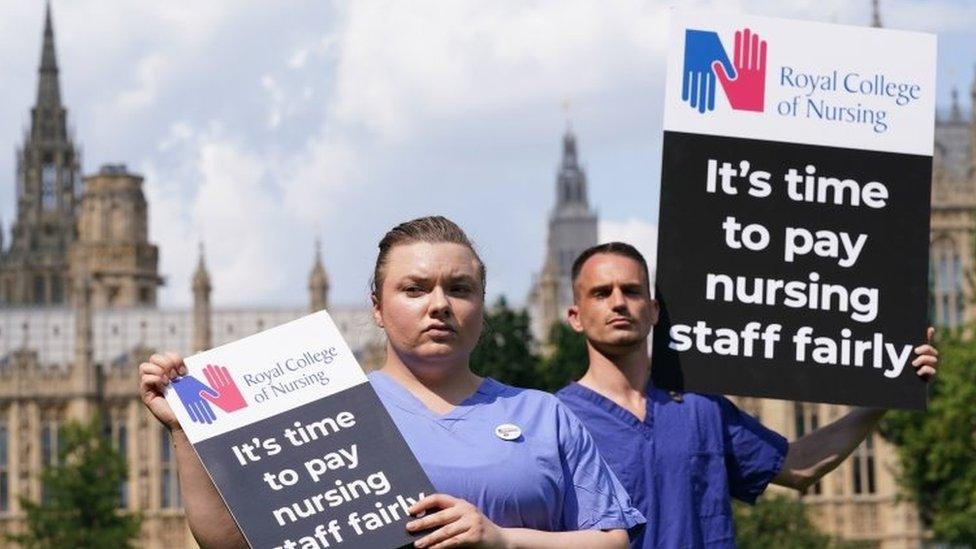Nurses offer to call off strikes in England if Sunak makes fresh pay offer
- Published

The head of the UK's biggest nursing union has urged Rishi Sunak to make a new pay offer to avoid next week's planned strikes in England going ahead.
In a letter seen by the BBC, head of the Royal College of Nursing Pat Cullen said she was "appealing directly" to Mr Sunak for the first time.
Citing pay negotiations in Wales and Scotland, she said a renewed offer or fresh talks could halt the action.
Health Secretary Steve Barclay said the action was "regrettable".
Monday is thought to be biggest day of strike action in NHS history.
Nurses in England and ambulance staff in England and Wales have coordinated action for the first time in an ongoing row about pay and working conditions.
Staff from both services will strike on Monday, and nurses will also strike on Tuesday. Ambulance staff are also poised to take part in walkouts on Friday.
In a letter to the prime minister, Ms Cullen wrote that a "meaningful" pay offer from the government could still avert strike action.
She drew a comparison with his swift action in sacking Conservative Party chairman Nadhim Zahawi after he was found to have breached the ministerial code in relation to his tax affairs.
"As shown by last weekend's fast-paced changes in Cabinet, big decisions can be made by you at any point in the week in the interests of good government," she wrote.
"I am urging you to use this weekend to reset your government in the eyes of the public and demonstrate it is on the side of the hardworking, decent taxpayer.
"There could be no simpler way to demonstrate this commitment than bringing the nurse strike to a swift close."
Mr Barclay said while NHS contingency plans are in place, the strikes "will undoubtedly have an impact on patients and cause delays to NHS services".
He said: "We accepted the recommendations of the independent pay review body to give over one million NHS workers, including nurses and ambulance workers, a pay rise of at least £1,400 this financial year.
"I have been having constructive talks with unions about what is affordable for 2023/24, and urge them to call off the strikes and come back around the table."
The renewed calls for a government response from the RCN come after Welsh NHS staff suspended strike action following an improved offer from ministers.
"Yesterday, the Welsh government made an offer of an additional 3% for the current financial year," Ms Cullen wrote.
"Consequently, we cancelled our strike action in Wales for Monday and Tuesday. In Scotland, negotiations continue over additional funding for the current year too and there are no planned strikes.
"Your government looks increasingly isolated in refusing to reopen 2022/23," she said, adding she had made it clear in meetings with England's Health Secretary Steve Barclay "that opening negotiations and making meaningful offers can avert strike action".
Referring to the prime minister's comments in an interview this week to mark his 100th day in office - in which he said nurses should be treated as "an exception" - Ms Cullen said the prime minister "appeared to demonstrate a change in tone in respect of the strike by nursing staff".
Ms Cullen urged Mr Sunak to "use this weekend to reset your government in the eyes of the public" and show it is "on the side of the hardworking, decent taxpayer" by bringing the dispute to an end.
In England, most NHS staff have already received a pay rise of roughly £1,400 this year - worth about 4% on average for nurses. The RCN is calling for a 19% pay rise, although it has indicated it may meet the government "halfway".
Unions representing ambulance workers and physiotherapists also want above-inflation pay rises, but have not specified a figure.
The government says the demands are unaffordable, and that pay rises are decided by independent pay review bodies.
Union members in England are planning to strike on 6 and 7 February.

Have you had a medical appointment or operation cancelled due to the strikes? Share your experiences by emailing haveyoursay@bbc.co.uk, external.
Please include a contact number if you are willing to speak to a BBC journalist. You can also get in touch in the following ways:
WhatsApp: +44 7756 165803
Tweet: @BBC_HaveYourSay, external
Please read our terms & conditions and privacy policy
If you are reading this page and can't see the form you will need to visit the mobile version of the BBC website to submit your question or comment or you can email us at HaveYourSay@bbc.co.uk, external. Please include your name, age and location with any submission.
Related topics
- Published3 February 2023

- Published25 November 2022

- Published2 May 2023
